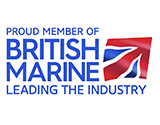- Planning and execution of coastal passages considering the capability of the yacht and crew, weather, tidal streams and heights, navigation, charts and publications, provisions, fuel, water, customs procedures.
- Passage Planning strategies for upwind, downwind and Traffic Separation Schemes.
- Preparation for sea including safety equipment for coastal and offshore passages, stowage, safety briefing, watch keeping, delegation of responsibilities, engine checks.
- Pilotage. Preparing a pilotage plan considering techniques using soundings, transits, back bearings, clearing bearings, buoyage, port or harbour regulations and tidal constraints. Day and Night pilotage
- Skippering a yacht and crew at sea – responsibilities, navigational discipline, effective use of electronic navigational systems and safety systems, radio watches, organisation of watches and duties, supervision on deck, crew welfare.
- Meteorology – interpreting forecasts, visual cues and meteorological trends.
- Heavy Weather – yacht and crew preparation for strong winds or gales, decision making, navigational strategy, sail plans. Yacht handling in strong winds and/or heavy seas.
- Restricted Visibility and Fog – General conduct, Rules, Navigational and pilotage strategy.
- Yacht handling under Power – effective control in a confined space.
- Yacht handling under sail – yacht control and manoeuvre in a confined space under sail, anchoring and mooring under sail in various conditions opf wind and tide, sail control on all points of sailing, downwind sailing techniques.
- Emergencies – Man overboard recovery under power and sail, lifeboat rescue and helicopter rescue.
- Rules of the Road – maintaining an effective lookout at sea, assessing collision risk, effective decision making.
- Dinghies – loading, safety, handling a dinghy under oars.
- Meteorology – weather forecasts – where to get them, the Beaufort scale for wind speed. Seasickness – can make an effective contribution to the crew even if affected by sea-sickness. (Note that sea-sickness is quite unlikely on the majority of weekend and 5 day courses which take place in relatively sheltered waters).
- Helmsmanship and Sailing Skills – the principles of sailing and sail trim, sailing manoeuvres – going about and gybeing, points of sail.
- Steering a compass course under sail and power, sailing close-hauled.
Syllabus for RYA Coastal Skipper Practical (Sail)
“
Copyright © 2024 Elite Sailing in Chatham, Kent, near London, All rights reserved.
Elite Sailing is a Trading Name of Allan Yachting Limited
Website Design by madcreative.


